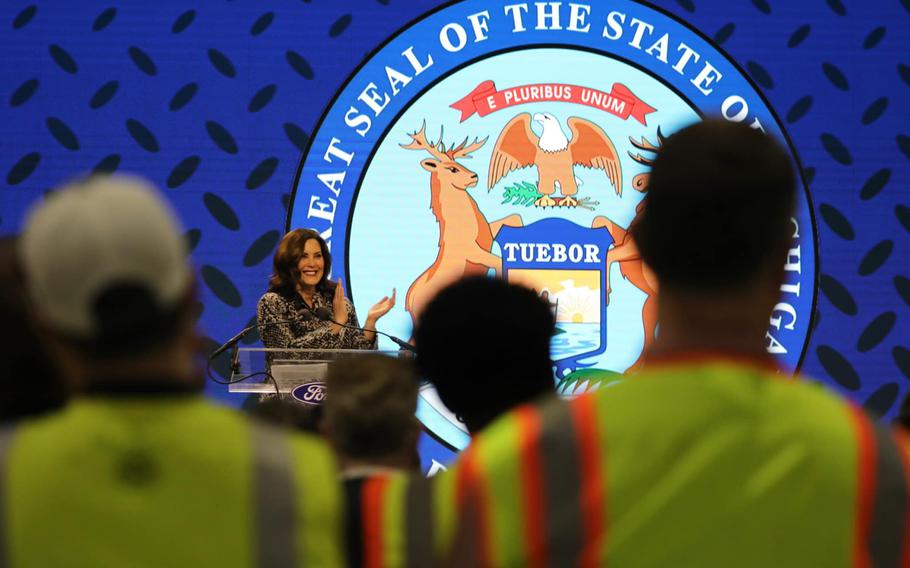
Michigan Gov. Gretchen Whitmer (D) is shown speaking at an event for Ford in February 2023. Whitmer focused on the domestic jobs the Ford battery plant would create. (Facebook)
Ford announced it will build a $3.5 billion battery factory in Michigan based on Chinese technology, underscoring China’s prominent position in the electric-vehicle industry even as political tensions rise.
Ford said it will fully own the factory in Marshall, Mich., which will use technology and services provided by China’s CATL, the world’s largest battery manufacturer. Until the plant is up and running in 2026, Ford said it will import batteries from CATL for use in some vehicles for U.S. sale.
The Detroit automaker said the Chinese technology would allow for faster charging times in some EVs and would help make the vehicles more affordable. The factory will create 2,500 jobs.
The deal comes as already poor U.S.-China relations reached a new low in recent weeks over a Chinese spy balloon discovered in U.S. airspace and shot down by the U.S. military. The incident followed several years of tension over trade and technology, during which the United States has increasingly restricted tech exports to China that it said might otherwise aid Beijing’s military and human rights violations.
Despite growing tensions, however, China has become a major player in the electric-vehicle business, with its factories churning out more EVs and batteries than those in the West. The nation’s rise in an industry previously dominated by Western companies will foist tough decisions on global automakers attempting to stay on top of the latest technology while navigating the East-West tensions.
Asked about the political risks of relying on Chinese technology at a time of worsening U.S.-China relations - particularly as the United States is increasingly blocking technology exports to China — Lisa Drake, vice president of EV industrialization at Ford, said the company had planned carefully.
“We certainly thought through that and those are provisions and things we’ve agreed with CATL in the course of our contract work,” Drake told reporters. “Of course we thought about it and we’ve taken care of the optionality with that in the contract.”
“It’s really important to understand that Ford controls the plant,” Drake added. CATL personnel will help set up the factory and some “will be staying on afterwards to help with the facility,” she said. “But we will operate the facility. It will be a Ford plant manager.”
Virginia Gov. Glenn Youngkin (R) said last month that he had taken Virginia out of the running for the plant in December, citing concerns about doing business with the Chinese Communist Party.
“We felt that the right thing to do was to not recruit Ford as a front for China to America,” Youngkin told reporters in January after his annual State of the Commonwealth speech.
Ford had been eyeing a site in Southside Virginia near Danville and Martinsville, a part of the state has lost thousands of manufacturing jobs in recent years as textile and furniture factories relocated overseas. Local lawmakers said they had mixed feelings about Youngkin’s decision — sorry to see the region miss out on badly needed jobs but uncomfortable with the national security implications of the Chinese involvement. Ford on Monday didn’t respond to a request for comment on Virginia’s decision.
In a statement Monday, Michigan Gov. Gretchen Whitmer (D) focused on the domestic jobs the Ford plant would create.
“Let’s continue bringing the supply chain of electric vehicles, chips, and batteries home while creating thousands of good paying jobs and revitalizing every region of our state,” she said.
Like much of China’s EV industry, CATL grew with the help of big government investments in the industry. China has spent tens of billions of dollars to support electric vehicles, including research-and-development funding, tax exemptions, consumer incentives and financing for battery-charging stations.
Beijing cranked up that aid before other nations fully embraced EVs, helping its factories scale up earlier.
“They recognized early on the strategic nature of the energy transition and recognized, this is how we are going to build a position in the global auto market,” said Willy Shih, a Harvard Business School professor who specializes in technology and manufacturing.
The Ford deal shows that China has now “become a technology source, not always an importer,” Shih said. “And it’s because CATL has built scale. A lot of manufactured goods benefit from the learning curve. As you make more, your costs go down.”
The batteries that Ford will initially import from CATL, and then start making in Michigan, are lithium ion phosphate (LFP) batteries. Ford said they are “exceptionally durable” and use fewer high-cost materials. They also tolerate more frequent and faster charging, Ford said.
The company will start using them later this year in base models of the Mustang Mach E, and next year in the F150 Lightning pickup truck.
Marin Gjaja, chief customer officer for EVs, declined to comment on any specific price cuts that could result from using the CATL batteries.
“We can’t give you specific pricing information now because that will depend on what happens in the market. but the intent is to make these more affordable and more accessible to customers,” he told journalists.
The Michigan plant is part of a string of U.S. factories automakers are building for the EV transition. Ford and South Korea’s SK Innovation plan to invest $11 billion in new manufacturing campuses in Tennessee and Kentucky that will employ 11,000 people to make vehicles and batteries.
General Motors has pledged to spend $7 billion — its largest investment ever — on four Michigan manufacturing sites for battery cells and electric vehicles. It’s also making big investments in EV and battery factories in Ohio, Tennessee, Canada and Mexico.
The Washington Post’s Gregory S. Schneider contributed to this report.